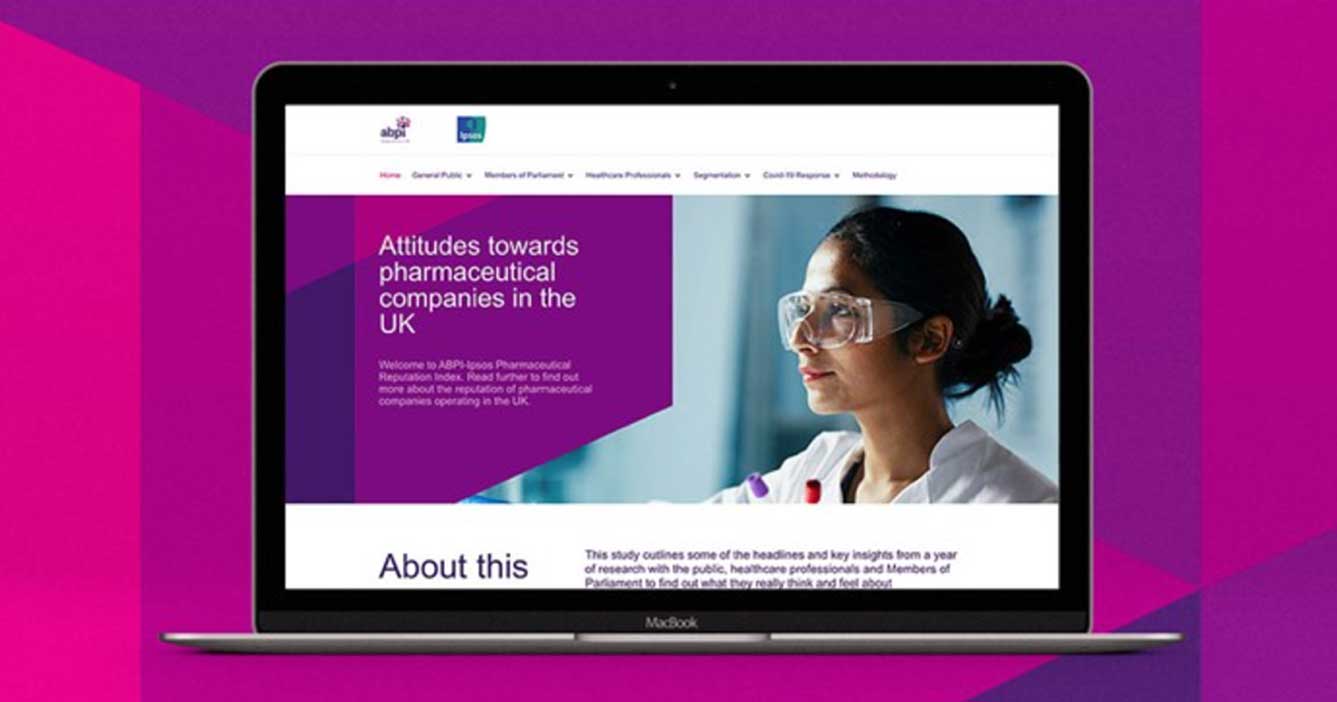New research reveals attitudes to pharmaceutical industry
Research published by Ipsos MORI and the ABPI provides new insight into perceptions of the pharmaceutical sector in the UK, and how these have been shaped by the pandemic.
This work gives us great insight into how the commitment and dedication of companies in the face of this pandemic has impacted our reputation with the public and with the NHS we work so closely with. And where we can improve. Ben Osborn
The findings are part of a year-long study - which included qualitative research and quantitative surveys – of the perceptions of healthcare professionals (HCPs), the public and Members of Parliament.
The study provides a comprehensive snapshot of the industry’s reputation shaped by companies’ actions to research, develop and deliver vaccines and treatments to help battle the pandemic.

The research found positive sentiment between industry and healthcare professionals and improvement in sentiment among the public since the pandemic, however, with general awareness of the industry low, there is still work to do to help people understand the sector better. Among the findings are:
- Almost seven in ten (67 per cent) of HCPs interviewed believe the pharmaceutical industry has supported the NHS during the pandemic.
- Over three-quarters of HCPs (76 per cent) think that the sector is doing all it can to develop solutions to end the pandemic.
- Almost two-thirds of HCPs (64 per cent) also believe the industry is continuing to invest in research for other disease areas while the pandemic continues.
The research among more than 8,000 members of the public across the UK between July 2020 and March 2021 showed
- In March 2021, 60 per cent of the public said their views of the industry had improved since the pandemic.
- This is a significant improvement from July 2020 – the first wave of the study - when just 36 per cent said the same.
- In March 2021 more than seven in ten people (71 per cent) believe that pharmaceutical companies operating in the UK have supported the NHS during the pandemic and that they are making medicines and vaccines for COVID-19 available and affordable for everyone (68 per cent)
- This sentiment has improved since the early days of the pandemic – just around half (53/51 per cent respectively) agreed this was the case in July 2020.
Encouragingly, the research also found that almost 9 in 10 (87 per cent) of people in the UK have either already received the COVID-19 vaccine or are willing to have one.
In qualitative research, Ipsos MORI found gratitude for developing the COVID-19 vaccines and an increased sense of national pride.
Whilst general sentiments about the pharmaceutical industry have improved, this has yet to translate into a deeper understanding of the sector and role of companies in health in normal times.
- As of March 2021, few – just one in seven (14 per cent) – feel they know a lot or a fair amount about the sector; unchanged since the first wave of this study back in July 2020.
- In July 2020 only around three in ten people (28%) could recall seeing or hearing anything about the industry. In March 2021 this had jumped to over half (52%).
Beyond the pandemic:
- Almost seven in ten (69 per cent) believe that the UK industry plays a leading role globally in discovering new medicines, compared with three in five (59 per cent) early in the pandemic - June 2020.
- Over two thirds (69 per cent) believe the UK plays a leading role globally in discovering new medicines.
- And half (50 per cent) think the UK has more advanced research facilities than the rest of the world.
Though people are becoming increasingly likely to understand that the sector pioneers research, development, manufacturing and supply of vital medicines and vaccines, around two in five believe that the sector makes beauty products (40%) or runs pharmacies (38%). This position remains unchanged since July 2020.
Commenting on the findings, Richard Torbett, Chief Executive of the ABPI, said:
“Some of the world’s leading pharmaceutical companies call the UK home for advanced research, development and manufacturing. The success of the Oxford-AstraZeneca vaccine and the rollout of five different COVID-19 jabs globally– just 18 months on from the start of the pandemic – has boosted the public’s awareness and improved how they perceive the industry. This is encouraging to see, but we need to keep doing more to explain how we work and how we support the NHS and patients.
Increasing trust and transparency with healthcare workers
The research among HCPs included over 100 interviews with NHS Healthcare Professionals split across the following occupations: GPs, nurse prescribers, hospital pharmacists and chief pharmacists
Outside of the pandemic, more than three quarters (77 per cent) agree that companies support the NHS with treating patients, and 56 per cent that they work closely with NHS doctors to develop new medicines.
Around three quarters (77 per cent) say that they have had contact with the pharmaceutical industry as part of their work over the past year – nearly all said those interactions were helpful, or essential, for their role (respectively 82 per cent and 12 per cent)
The majority of healthcare professionals believe the sector helps deliver positive outcomes for health through delivering new medicines. The findings show:
- 85 per cent say the industry produces effective medicines.
- 79 per cent believe it contributes to improving health globally.
- 70 percent that it delivers medicines for unmet need.
- 68 per cent that it listens HCPs to understand the needs of their patients.
However, the research also suggested that there is some way to go for the industry to gain the trust of healthcare workers in line with other health organisations. While very few are openly critical of the sector, companies are trusted less than other medical and research organisations like universities and health charities.
However, among the HCPs who are familiar with the ABPI Code of Practice (73 per cent) – which sets out strict rules for how companies interact with partners, including the NHS - over three quarters (78 per cent) believe it demonstrates companies’ commitment to benefitting patients and acting in an ethical manner.
The sector is seen as more trustworthy than other corporate sectors such as the automotive industry or banking, but still only at about three in ten people saying they ‘trust’ those pharma companies operating in the UK.
Ben Osborn, President of the ABPI, said:
“We have to learn from the successes of the past year and ensure that the spirit of collaboration and a mission-led approach to tackling all diseases is at the heart of everything we do. This work gives us great insight into how the commitment and dedication of companies in the face of this pandemic has impacted our reputation with the public and with the NHS we work so closely with. And where we can improve.
Elliot Dunster, Executive Director of Corporate Affairs and Devolved Nations at ABPI said:
“So many assumptions are made about what people think about the pharmaceutical industry. By tracking the views of the general public, health care professionals and politicians, our new Reputation Index gives a much more complete picture – including on how companies have responded to the pandemic.
“We want this to become the ‘go to’ resource for people looking to understand more about the industry’s reputation in the UK”.
Thomas Fife-Schaw, Research Director at Ipsos MORI, said:
“The pandemic has drawn attention to the work of pharmaceutical companies in a way we’ve not seen before – especially in the media.
“Our work in Ipsos Corporate Reputation often shows that familiarity with an organisation leads to positive sentiment, increased trust, and support – such as being open to a company’s point of view. This index shows the sector how it is regarded from the outside-in and what this might mean for the future, as the pandemic continues to shine a light on its work.”
The new research is captured as part of a new UK Pharma Reputation Index, an industry tracker to monitor the reputation of the sector over the long-term and help companies understand public, healthcare professional and government perception of their work.
This comes alongside a new microsite. The data will provide an annual snapshot for the sector.
#ENDS#
- Reputation
Last modified: 29 November 2023
Last reviewed: 29 November 2023
